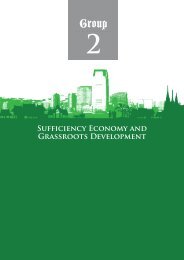Conflict, Legitimacy and Government Reform: Equitable Allocation of ...
Conflict, Legitimacy and Government Reform: Equitable Allocation of ...
Conflict, Legitimacy and Government Reform: Equitable Allocation of ...
Create successful ePaper yourself
Turn your PDF publications into a flip-book with our unique Google optimized e-Paper software.
Panel Discussion<br />
transition for China from an authoritarian system to one based on<br />
democracy <strong>and</strong> the respect for human rights.” 5<br />
India, the world’s largest democracy, has no fear <strong>of</strong> vibrant debate<br />
or expressions <strong>of</strong> public opinion. However, the size <strong>of</strong> its enormous<br />
political system <strong>and</strong> wide disparities <strong>of</strong> income <strong>and</strong> opportunity give few<br />
Indian children experience in grassroots democracy. Indian educators<br />
were skeptical initially that the United States had much to <strong>of</strong>fer to India<br />
in the field <strong>of</strong> democracy education. However, when they saw Project<br />
Citizen’s implementation in neighboring countries such as Malaysia they<br />
recognized its potential contribution to Indian students. Project Citizen<br />
has spread there from pilot projects in eleven schools to hundreds <strong>of</strong><br />
schools throughout the country. Most recently, the Jawahar Navodaya<br />
Vidyalaya (JNV) schools, founded by assassinated former Prime<br />
Minister, Rajiv G<strong>and</strong>hi, have adopted it. The JNV schools are free<br />
academies with the mission <strong>of</strong> providing a good quality, modern<br />
education to talented children predominantly from rural areas. Many <strong>of</strong><br />
the children are the first in their families to attend school.<br />
Our work with KPI in Thail<strong>and</strong> aims to increase civic <strong>and</strong> political<br />
participation, <strong>and</strong> to strengthen tolerance <strong>and</strong> respect for human rights<br />
<strong>and</strong> the rule <strong>of</strong> law among young people. We have used the Project<br />
Citizen curriculum I mentioned earlier for several years <strong>and</strong> are just about<br />
to introduce the Foundations curriculum widely in Thai schools.<br />
A program initially focused largely on Bangkok <strong>and</strong> larger cities is now<br />
becoming truly national in scope <strong>and</strong> has held very successful trainings<br />
<strong>and</strong> showcases in the South <strong>and</strong> Deep South. I’m very pleased that I will<br />
have the opportunity to travel Sunday to Songkla for the first time <strong>and</strong><br />
see the great work being done there first h<strong>and</strong>. Tolerance is a core value<br />
<strong>of</strong> the democratic principles <strong>and</strong> practices contained in our materials <strong>and</strong><br />
a special emphasis <strong>of</strong> KPI’s programs in the South <strong>and</strong> Deep South.<br />
We are also encouraged by an insightful decision by Dr. Borwornsak<br />
to include Project Citizen as an integral part <strong>of</strong> the training provided to<br />
5 Recorded by the author at a training session in October 2006. Unfortunately, the<br />
name <strong>and</strong> location <strong>of</strong> the <strong>of</strong>ficial cannot be provided without some risk.<br />
87














